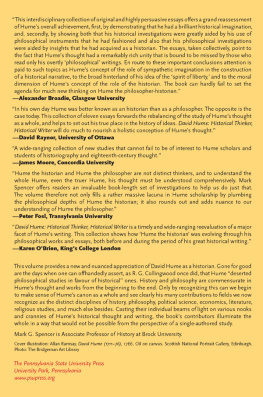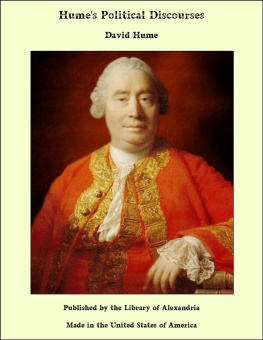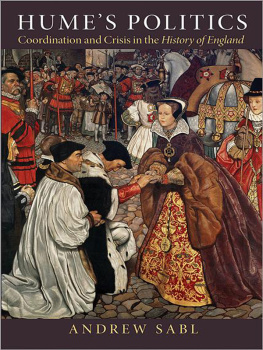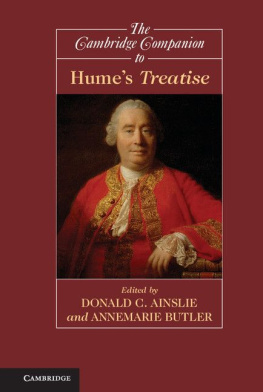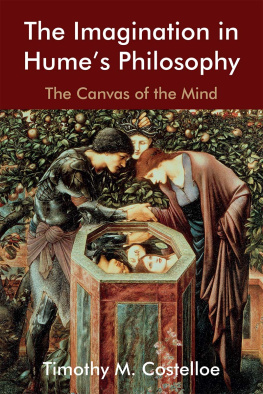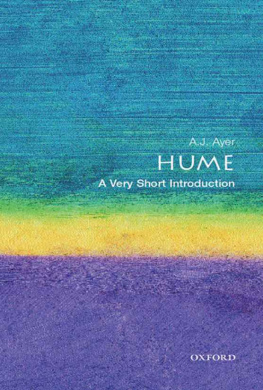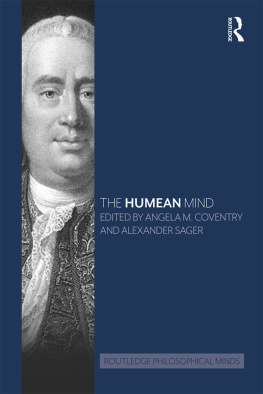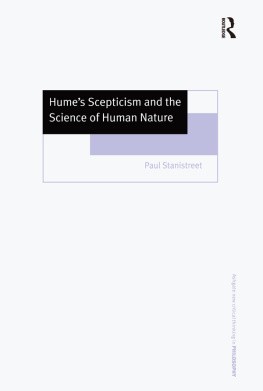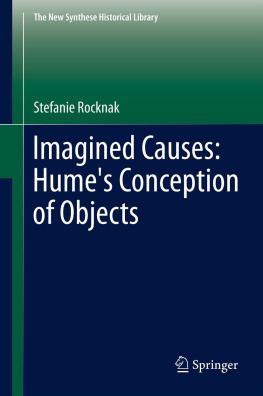
David Hume

edited by MARK G. SPENCER
David Hume
HISTORICAL THINKER, HISTORICAL WRITER
THE PENNSYLVANIA STATE UNIVERSITY PRESS
UNIVERSITY PARK, PENNSYLVANIA
Library of Congress Cataloging-in-Publication Data
David Hume : historical thinker, historical writer / edited by Mark G. Spencer.
p. cm
Summary: A transdisciplinary collection of essays focusing on David Hume as historian, and arguing that his historical and philosophical works are more intimately connected than scholars have often assumedProvided by publisher.
Includes bibliographical references and index.
ISBN 978-0-271-06154-2 (cloth : alk. paper)
ISBN 978-0-271-06155-9 (pbk. : alk. paper)
1. Hume, David, 17111776Criticism and interpretation.
2. Great BritainHistoriography.
3. EnglandHistoriography.
4. Hume, David, 17111776. History of England.
I. Spencer, Mark G., editor of compilation.
DA759.7.H86D38 2013
942.007202dc23
2013023131
Copyright 2013 The Pennsylvania State University
All rights reserved
Printed in the United States of America
Published by The Pennsylvania State University Press, University Park, PA 16802-1003
The Pennsylvania State University Press is a member of the Association of American University Presses.
It is the policy of The Pennsylvania State University Press to use acid-free paper. Publications on uncoated stock satisfy the minimum requirements of American National Standard for Information SciencesPermanence of Paper for Printed
Library Material, ANSI Z 39.481992.
For
FREDERICK A. DREYER (19322012)
historian, teacher, friend
CONTENTS
Many people have helped to make this book possible. For financial support, I am especially grateful to the Social Sciences and Humanities Research Council of Canada and the Humanities Research Institute at Brock University. At The Pennsylvania State University Press, Sandy Thatcher (now retired) gave the fledgling idea his backing early on. Kendra Boileau, with her assistant Robert Turchick, guided the project through to production, where Laura Reed-Morrisson, Kathleen Kageff, Steve Kress and Patricia Mitchell expertly saw things through to the end. My colleagues and students in the Department of History at Brock University listened with keen interest (not always feigned) and lent their encouragement along the way. Exacting research assistance from Mathieu Robitaille (BA, Brock University, 2009) and Janet Baines (MA, Brock University, 2010) is evident in the bibliography. As always, my greatest supporters are found at home, where Kelly and our two boys, Thomas and William, indulge with such good-natured ease the curious pursuits of their resident historian.
Mark G. Spencer
St. Catharines
In this volume, citations to Humes texts are provided parenthetically. Unless stated otherwise, citations give the titles (abbreviated as described in the list below) and page numbers of the edition cited. For example, E 563 refers to page 563 of Millers edition of Humes Essays. For citations to some of Humes texts, however, it is useful to provide more information than the page number of a particular edition. References to Humes History take the following form: title, volume, page. Thus, H 2:525 refers to volume 2, page 525, of Todds edition of Humes History. References to Humes Enquiries provide the title, section, and paragraph number of the Beauchamp edition, followed by the page number of the Selby-Bigge/Nidditch edition, where applicable. For example, EHU 12.4/150 refers to section 12, paragraph 4, in Beauchamps edition of the first Enquiry; page 150 in Selby/Nidditch. Similarly, references to Humes Treatise provide the title, book, part, section, and paragraph number in the Nortons edition, followed by the page number of the Selby-Bigge/Nidditch edition, so that T 1.3.4.2/8283 refers to Treatise book 1, part 3, section 4, paragraph 2; pages 82 and 83 in Selby-Bigge/Nidditch.
List of Abbreviations
| E | Essays Moral, Political, and Literary, edited by E. F. Miller, rev. ed. (Indianapolis: Liberty Classics, 1987). |
| EHU | An Enquiry concerning Human Understanding, edited by T. L. Beauchamp (Oxford: Clarendon Press, 2000). |
| An Enquiry concerning Human Understanding, in Enquiries concerning Human Understanding and concerning the Principles of Morals, edited by L. A. Selby-Bigge and P. H. Nidditch, 3rd ed. (Oxford: Clarendon Press, 1975). |
| EPM | An Enquiry concerning the Principles of Morals, edited by Tom L. Beauchamp (Oxford: Clarendon Press, 1998). |
| An Enquiry concerning the Principles of Morals, in Enquiries concerning Human Understanding and concerning the Principles of Morals, edited by L. A. Selby-Bigge and P. H. Nidditch, 3rd ed. (Oxford: Clarendon Press, 1975). |
| H | The History of England, from the Invasion of Julius Caesar to the Revolution in 1688, edited by William B. Todd, 6 vols. (Indianapolis: Liberty Classics, 1983). |
| L | The Letters of David Hume, edited by J. Y. T. Greig, 2 vols. (Oxford: Clarendon Press, 1932). |
| NHR | The Natural History of Religion, in A Dissertation on the Passions and The Natural History of Religion, edited by Tom L. Beauchamp (Oxford: Clarendon Press, 2007). |
| NL | New Letters of David Hume, edited by R. Klibansky and E. C. Mossner (Oxford: Clarendon Press, 1954). |
| T | A Treatise of Human Nature, edited by David Fate Norton and Mary J. Norton (Oxford: Clarendon Press, 2000). |
| A Treatise of Human Nature, edited by L. A. Selby-Bigge, 2nd rev. ed. P. H. Nidditch (Oxford: Clarendon Press, 1978). |
David Hume (17111776) appreciated the centrality of historical thinking and writing to the enlightened world within which he lived. As the aging scholar put it reflectively in 1770 in a letter to his London publisher, William Strahan, I believe this is the historical Age and this the historical Nation (L 2:230). By then, of course, Hume had done much to contribute to that state of affairs in Britain and beyond. All six volumes of his The History of England, from the Invasion of Julius Caesar to the Revolution in 1688 (175462) had been published and were circulating far and wide throughout the British Atlantic world. Humes History would continue to attract large numbers of readers for the remainder of the authors lifetime and remained a best seller well into the nineteenth century. Little wonder that the card for Hume in the catalogue of the British Library differentiated him then (as it still does) as David Hume, the historian. The records left by the earliest readers of Humes Historyeven its noisiest criticsprovide telling evidence of how influential Humes account was and also of just how much history mattered to Hume and his contemporaries.
If we want to recapture the essence of Humes place in the eighteenth-century history of ideas, then surely his historical thinking and writing ought to inform our understandings to a significant degree. But modern scholars have been far less interested in Hume as historical thinker and writer than were Humes contemporaries. It is Hume the philosopher, and especially Hume the philosopher of book 1 of A Treatise of Human Nature (173940), whom scholars of Hume and general readers alike now know best. The
Next page
